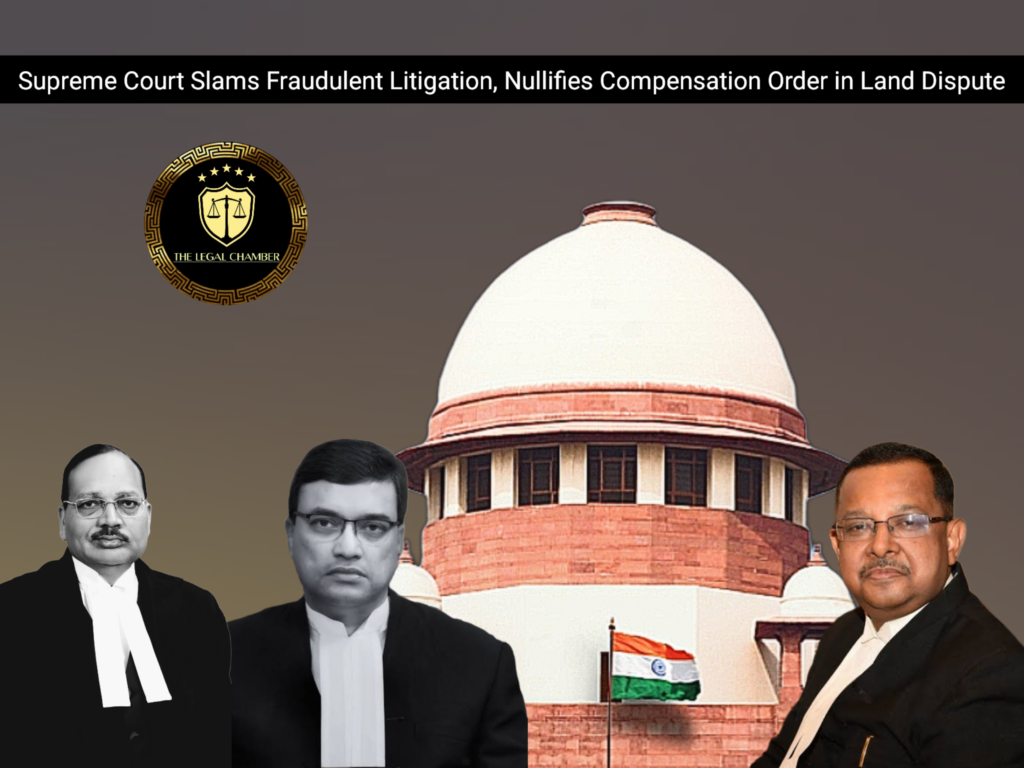
The Supreme Court held that judicial orders obtained through fraud are null and void, as “fraud unravels everything.” It emphasized that suppression of material facts vitiates proceedings, regardless of the court’s hierarchy. The doctrine of merger does not apply to fraudulent judgments. The Court recalled its earlier order and remanded the case to the High Court for fresh adjudication, affirming that fraud is an exception to finality in litigation. Procedural technicalities cannot shield fraudulent litigants from judicial scrutiny.
Facts Of The Case:
The case involves a dispute over land ownership and compensation between Vishnu Vardhan, Reddy Veeranna, and T. Sudhakar. The trio jointly purchased land in Gautam Budh Nagar, Uttar Pradesh, in 1997, which was later acquired by NOIDA in 2005. Reddy filed a writ petition before the Allahabad High Court in 2019, claiming exclusive ownership and seeking enhanced compensation, which was granted in 2021. Vishnu challenged this order, alleging fraud—claiming Reddy suppressed material facts, misrepresented ownership, and obtained a compromise decree in 2006 through a forged power of attorney. The Supreme Court found that Reddy concealed Vishnu’s co-ownership in multiple proceedings and manipulated judicial processes to secure favorable orders. The Court ruled that fraud vitiates all judicial acts, nullifying the High Court’s order and its own 2022 judgment upholding Reddy’s claim. It remanded the case to the High Court for fresh consideration, directing impleadment of all parties and allowing evidence on rightful compensation. The Court also restrained Reddy from alienating assets and emphasized that procedural rules cannot protect fraudulent litigations. The judgment reinforces that courts must act against deceit to uphold justice.
Procedural History:
The procedural history of this case spans multiple judicial forums over several years. It originated in 1998 when Vishnu, Reddy, and Sudhakar jointly filed a civil suit (No. 416/1998) against NOIDA to protect their land rights, resulting in a decree in their favor in 2000. Subsequent disputes arose when Reddy allegedly obtained a fraudulent compromise decree in 2006 (Civil Suit No. 370/2006) declaring him the sole owner. In 2019, Reddy filed a writ petition (No. 2272/2019) before the Allahabad High Court, which ruled in his favor in 2021, awarding him enhanced compensation. Vishnu challenged this order in the Supreme Court through a civil appeal (No. 7777/2023) and a writ petition (No. 673/2023), alleging fraud. Meanwhile, NOIDA separately contested the compensation in another appeal (No. 3637/2022). The Supreme Court, in its 2025 judgment, set aside the High Court’s order and its own 2022 decision in Reddy Veerana, declaring them null due to fraud. It remanded the case to the High Court for fresh adjudication, ensuring all parties, including Vishnu and Sudhakar, are heard. The Court also directed Reddy to maintain the disputed compensation amount as security pending final resolution.
READ ALSO :Supreme Court Ruling : Doubt Over Witness Claims Leads to Acquittal in TN Murder Case
Court Observation:
The Supreme Court made several critical observations in its judgment. It emphatically reiterated that fraud vitiates all judicial acts, rendering even final judgments null and void if obtained through deception. The Court found Reddy had suppressed material facts about joint ownership and manipulated proceedings by excluding co-owners, constituting a fraud on the court. It rejected the argument of merger doctrine shielding fraudulent orders, clarifying that procedural finality cannot protect litigants who abuse the judicial process. The Bench emphasized that courts have inherent powers to recall judgments tainted by fraud, irrespective of hierarchy or procedural timelines. It also noted Reddy’s forum shopping and contradictory claims across cases, undermining judicial integrity. The Court underscored that access to justice under Article 21 includes protection against fraudulent litigation, and technicalities cannot override substantive justice. By remanding the case, it prioritized fair adjudication with all stakeholders heard, reinforcing that fraud is an exception to res judicata and merger principles. The observations reaffirm the judiciary’s zero-tolerance for deceitful practices.
Final Decision & Judgement:
In its final judgment, the Supreme Court allowed Vishnu Vardhan’s civil appeal (CA No. 7777/2023) and set aside the Allahabad High Court’s 2021 order in Reddy Veeranna v. State of Uttar Pradesh, declaring it null and void due to fraud. The Court also recalled its own 2022 decision in Reddy Veerana, holding that fraud vitiates even final judicial orders. The case was remanded to the High Court for fresh adjudication, with directions to implead Vishnu and Sudhakar as necessary parties and re-examine compensation claims after permitting evidence. The Court upheld Vishnu’s right to challenge fraudulent decrees and rejected Reddy’s procedural objections, emphasizing that justice cannot be subverted by technicalities. Additionally, it continued interim safeguards on Reddy’s assets to secure potential compensation. The ruling reaffirms that fraud unravels judicial proceedings and ensures equitable resolution in long-standing disputes. All pending suits were left to be decided on their own merits, preserving legal remedies for all parties.
Case Details:
Case Title: Vishnu Vardhan @ Vishnu Pradhan vs. The State of Uttar Pradesh & Ors. Citation: 2025 INSC 884 Appeal No.: Civil Appeal No. 7777 of 2023 Date of Judgment: July 23, 2025 Bench: Justice Surya Kant & Justice Dipankar Datta, & Justice Ujjal Bhuyan
Download The Judgement Here